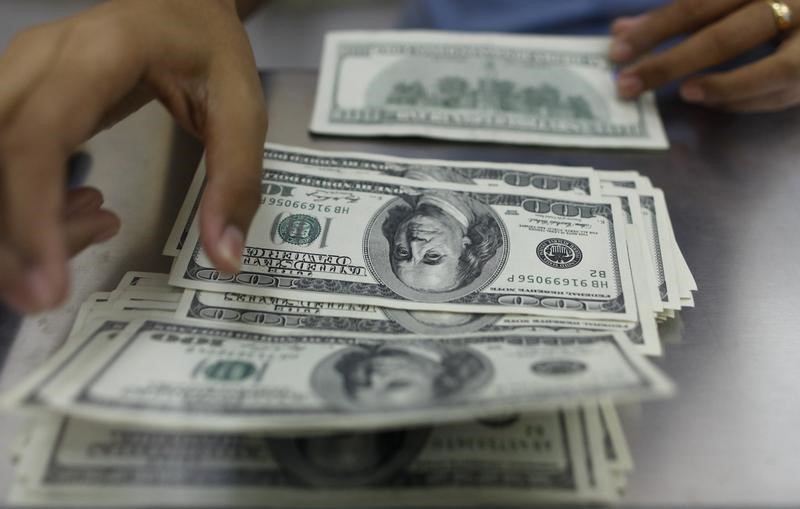By Nick Carey
CHICAGO (Reuters) - First thing every morning Bill Hickey turns on the TV to see where the U.S. dollar is trading in the hope it has lost value against the euro and other currencies.
"And there it is, staring you right in the face," says Hickey, president of Chicago-based steel company Lapham-Hickey Steel, about the dollar's continued strength. "The strong dollar is going to be bad for us and it's going to be bad for the U.S. industrial economy."
Mid-sized U.S. manufacturers, such as Lapham-Hickey, are likely to bear the brunt of the dollar's climb that has lifted it nearly 10 percent against the euro and 7 percent against major currencies since mid-December. Foreign exchange strategists polled by Reuters shortly after the euro hit an 11-year low of $1.11 on Jan 26 cited a nearly one-in-three chance the euro would hit parity or lower in the coming year.
Multinational giants with operations around the world are less vulnerable because they have costs in local currencies that act as de-facto currency hedges. But small and medium-sized U.S. firms, which account for about a third of U.S. exports, worry that the strong dollar will make their goods more expensive in foreign markets and less competitive at home.
While most major currencies, including the yen and the pound, have been weakening against the dollar over the past months, the euro tumbled the most in recent weeks, a boon for manufacturers in Germany and beyond.
Hickey has not yet laid off any of the 600 workers at the company's six plants, five around the Midwest and one in Connecticut, and is seeking new customers to offset lost business. But he worries about the dollar's impact on key clients, such as Caterpillar Inc, Deere & Co or major automakers.
Caterpillar CEO Doug Oberhelman voiced his concern in a Jan. 27 call with analysts, saying Japanese, UK or German rivals had "quite an advantage over their American competitors."
Some say the real pain has yet to come given that particularly the euro's sharp losses have been a relatively recent phenomenon. Others point out that tumbling oil and commodity prices have made it harder to discern the currency effect.
Indiana Manufacturers Association president Patrick Kiely said the dollar was just one agenda item at a recent board meeting. "There are so many moving parts, it's really too early to tell."
Drew Greenblatt, president of Baltimore-based Marlin Steel, which makes custom metal forms from baskets to hooks, says weak eurozone demand so far is a bigger concern for his business than the strong dollar.
"We're not hearing from customers 'your products are too expensive,'" Greenblatt said. "We're hearing 'the project has been canceled because the economy is in the tank."
Still, he expects a strengthening U.S. economy to more than make up for stagnant European sales, predicting Marlin Steel's revenue will grow to $7 million this year from $5.5 million. Over the next 18 months, Greenblatt plans to spend $2 million on new robots, expand his factory floor and add 10 new employees to his 30-strong work force.
Bill Dunkelberg, chief economist at the National Federation of Independent Business (NFIB), sees similar pattern among many other small and medium-sized businesses.
"The fact that the U.S. economy is bopping along really does help," he said.
The latest evidence of its improving health came on Friday, with non-farm payrolls shooting up by 257,000 last month, beating economists' forecasts.
The flip side is that European rivals are also taking note. In a survey released by the German American Chambers of Commerce in December, just as the euro was starting its swoon against the dollar, 98 percent of German firms polled said they expected to grow their business in the United States in 2015.
The survey focused on German Mittelstand, or small and medium-sized firms which generally do not have U.S factories.
"To these firms, 2015 looks like a very rosy year," said Mark Tomkins, vice president of the German American Chamber of Commerce in the Midwest.
"We see tremendous potential in the U.S. market," says Andy Stecher who runs the North American operations of German firm Plasmatreat.
For the company, which makes machines that apply plasma technology for everything from airplane wings to car headlights, the growing U.S. economy is more important than currency fluctuations, Stecher says. But the strong dollar comes as an added benefit and Plasmatreat expects to boost its U.S. sales.
The NFIB's Dunkelberg said customers of U.S.-based manufacturers were unlikely too switch suppliers if the dollar's strength proved short lived, but the longer it lasts, the greater the impact.

"If it becomes clear that we're expensive and we're going to stay there for a while, customers will adjust and then we'll feel it," he said.